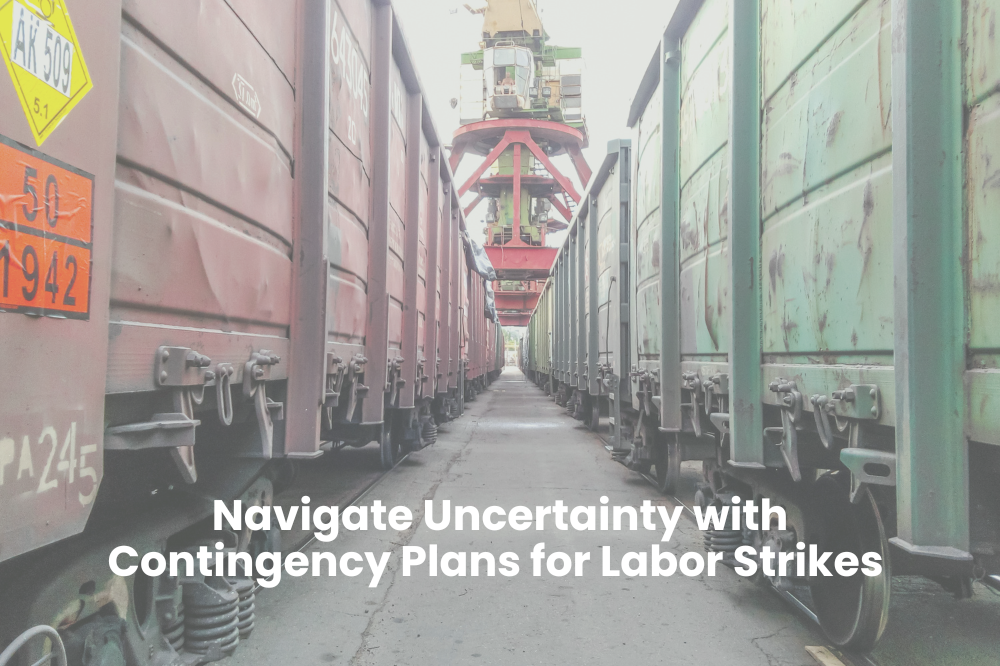The world of international shipping is no stranger to disruptions. From fluctuating fuel costs to unpredictable weather events, navigating the logistics landscape requires flexibility and a proactive approach. Currently, the looming threat of labor strikes in Canada’s ports and railways is causing challenges for businesses relying on timely and efficient freight transportation. Our goal is to equip you with the knowledge and resources needed to develop contingency plans for a potential challenges across the Canadian shipping industry; plus, we’ll delve into what’s new at the Panama Canal.
Potential Canada Port Labor Strikes
The current collective bargaining agreements between the International Longshore and Warehouse Union (ILWU) and various Canadian port authorities are set to expire soon. Because of that, the possibility of a labor strike at major Canadian ports such as Vancouver and Montreal is becoming increasingly likely. These ports are critical entry points for goods entering North America, handling millions of tons of cargo annually. Negotiations are ongoing, but the possibility of a labor strike disrupting operations cannot be entirely discounted. A labor strike would significantly affect cargo movement through Canadian ports, causing delays and potentially raising shipping costs.
A labor strike can cause substantial delays in shipping schedules, resulting in backlogs and congestion. Businesses may face increased demurrage charges, storage fees, and lost sales opportunities due to delayed deliveries. Additionally, alternative shipping routes may become overburdened, further exacerbating the issue.
Mitigating the Impact of Labor Strikes
While we cannot predict the future, there are steps you can take to mitigate the impact of a potential labor strike on your freight shipments. Businesses should proactively engage with their freight forwarders to develop contingency plans. This includes diversifying shipping routes, increasing inventory levels of critical goods, and maintaining clear communication with suppliers and customers.
Diversify Your Routes
Explore alternative routes for your shipments. If you routinely go through Canada’s major ports, explore other options up north or route cargo through the US instead. Researching and planning alternative routes beforehand allows for a quicker switch if a strike disrupts your primary route.
Monitor the Situation Closely
Stay in communication with your freight forward so you can remain informed about the ongoing negotiations between the ILWU and port authorities. This requires open communication to prepare for contingencies. That will enable you to manage expectations and minimize disruption to your business operations.
Expedite Your Shipments
If a strike seems imminent, consider expediting your shipments to ensure they arrive at their destination before any potential work stoppage. Your freight forwarder can help you with this as well.
CPKC and CN Railroads: Another Potential Disruption
Beyond potential labor strikes, ongoing labor negotiations between the Teamsters Canada Rail Conference (TCRC), the Canadian National Railway Company (CN), and Canadian Pacific Railway Limited (CP) could also lead to disruptions. A strike on the railroads would significantly affect the movement of goods across Canada and into the US. Similar to port labor strikes, this situation requires contingency planning.
Whether preparing for port labor strikes or rail strikes, the preparation is similar. You should be partnering with a freight forwarder to explore alternative transportation options and develop contingency plans to navigate unforeseen disruptions.
A Bright Spot: Increased Panama Canal Daily Slot Availability
While labor strikes pose challenges, there’s also some positive news on the horizon. Recent heavy rainfall in the Panama Canal watershed has increased water levels, allowing the canal authority to raise the daily maximum number of vessel slots. Prior to March 18, the maximum number of daily slots was 24, but as of March 24, that had bumped up to 27 spots.
Last year’s drought was the reason for diminished bookings, but increased rainfall and proactive water-saving measures have had positive effects. While not yet up to pre-drought numbers, the direction is positive.
Cyclone Shipping: Your Partner in Unforeseen Circumstances
At Cyclone Shipping, we understand the importance of reliable and efficient freight forwarding. Our ever-present goal is to keep your supply chain moving smoothly, even in the face of potential disruptions such as labor strikes. With route optimization, real-time tracking, and proactive communication, we help you identify the best routes by leveraging advanced tracking technology. And our team is always available for any questions you have.
We encourage you to stay informed about ongoing labor negotiations and develop contingency plans to minimize the impact on your business. By remaining proactive and working with a reliable freight forwarder, you can ensure your shipments reach their destinations on time, even during periods of uncertainty.




